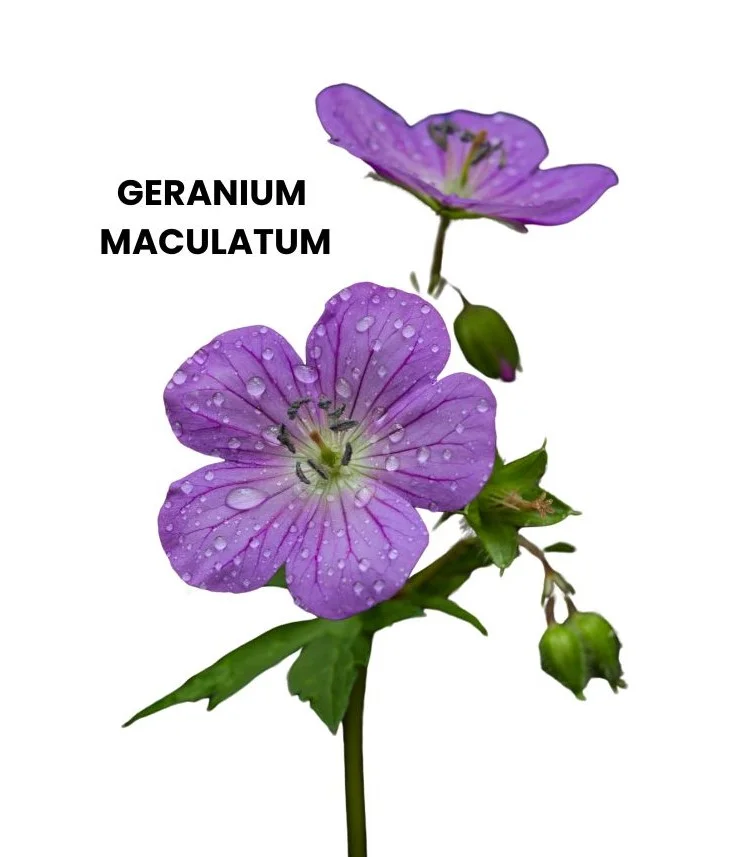Geranium Maculatum, commonly known as Crane’s-bill, is a perennial herb used in homeopathy and traditional medicine.
It is valued for its astringent properties and has been employed in treating a variety of conditions including gastrointestinal issues, hemorrhages, and headaches.

SOURCE INFORMATION
Scientific Classification
- Kingdom: Plantae
- Clade: Angiosperms
- Clade: Eudicots
- Order: Geraniales
- Family: Geraniaceae
- Genus: Geranium
- Species: maculatum
Geographical Distribution
- Geranium Maculatum, commonly known as Crane’s-bill, is native to North America.
- It is widely found in the eastern United States and Canada, thriving in woodlands, meadows, and shady areas.
- It prefers moist, well-drained soil and partial shade but can adapt to a variety of conditions.
Botanical Description
- This perennial herb grows to a height of 1 to 2 feet and has deeply lobed, toothed leaves.
- It produces pink to purple flowers in late spring to early summer, each with five petals.
- The plant is named “Crane’s-bill” due to the shape of its fruit, which resembles the bill of a crane.
Historical Facts
Traditional Use by Native Americans
- Various Native American tribes used Geranium Maculatum for its medicinal properties.
- It was a common remedy for wounds, sores, and gastrointestinal issues.
- The roots were often prepared as a poultice or decoction to stop bleeding and promote healing.
19th Century Medicinal Use
- In the 19th century, Geranium Maculatum became a popular botanical remedy in North American and European herbal medicine.
- It was used for its astringent and haemostatic properties to treat conditions like diarrhea, dysentery, and hemorrhages.
Modern Herbal Medicine
- Today, it continues to be used in herbal medicine, particularly for its ability to treat bleeding disorders and gastrointestinal ailments.
- Its astringent properties make it effective in managing conditions involving excessive discharge and inflammation.
Homeopathic Preparation
- In homeopathy, Geranium Maculatum is prepared by creating a tincture from the fresh root.
- This tincture is then diluted and succussed (shaken) to create various potencies used in homeopathic treatments.
INDICATIONS AND USES
- Hemorrhages: It is particularly effective in treating profuse bleeding from various organs, including pulmonary hemorrhages and postpartum haemorrhage.
- Gastrointestinal Issues: It addresses conditions like vomiting of blood, ulceration of the stomach, and chronic diarrhea with offensive mucus.
- Headaches: Known to relieve habitual sick headaches and giddiness.
- Skin and Mucous Membranes: Useful for atonic and foul ulcers, pharyngitis, and conditions involving excessive mucus secretion.
DRUG PATHOGENESIS
- Geranium Maculatum has astringent properties due to its high tannin content.
- It works by constricting tissues and blood vessels, reducing inflammation and hemorrhage.
- It is particularly effective in addressing issues related to bleeding, ulcers, and gastrointestinal disturbances.
KEY CHARACTERISTICS
- Astringent: Constricts tissues and blood vessels.
- Haemostatic: Stops bleeding from various organs.
- Anti-inflammatory: Reduces inflammation in the gastrointestinal tract and other areas.
- Gastroprotective: Helps in managing gastric ulcers and reducing vomiting.
DETAILED ORGAN SYMPTOMS
HEAD
- Giddiness (Dizziness): Often accompanied by double vision (diplopia). Improvement noted when eyes are closed.
- Ptosis: Drooping of the upper eyelid.
- Dilated Pupils: May occur alongside dizziness.
- Sick Headache: Persistent headaches that may be chronic.
MOUTH
- Dryness: Sensation of dryness in the mouth.
- Burning Tip of Tongue: Distinct burning sensation at the tip of the tongue.
- Pharyngitis: Inflammation of the pharynx causing sore throat.
STOMACH
- Catarrhal Gastritis: Inflammation of the stomach lining with excessive mucus secretion.
- Ulceration Tendency: Prone to developing ulcers with passive haemorrhage (bleeding).
- Vomiting in Gastric Ulcer: Lessens the tendency to vomit in cases of gastric ulcer.
STOOL
- Constant Urge: Persistent urge to defecate without success.
- Chronic Diarrhea: Long-term diarrhea with offensive mucus.
- Constipation: Difficulty in passing stools.
FEMALE
- Heavy Menstruation: Menses that are too profuse.
- Post-partum Haemorrhage: Excessive bleeding after childbirth.
- Sore Nipples: Pain and soreness in the nipples, often post-birth.
MODALITIES
- Worse: Symptoms worsen in cold, damp conditions and during menstruation.
- Better: Symptoms improve with rest and in warm, dry environments.
WHAT ARE MODALITIES IN HOMOEOPATHY?
RELATIONSHIP WITH OTHER DRUGS
Compare With
- Geranin 1x: Used for constant hawking and spitting in elderly individuals.
- Erodium (Hemlock-Stork’s Bill): Popular hemostatic in Russia, especially for metrorrhagia and menorrhagia.
- Hydrastinin, Cinchona (Cinch), Sabina (Sabin): Other remedies with hemostatic and astringent properties.
DOSE
- Tincture: Administered in half-dram doses for gastric ulcers.
- Attenuation: Typically used in tincture to third attenuation for general purposes.
- Topical Use: Applied locally in ulcers to destroy the pyogenic (pus-producing) membrane.
Frequently Asked Questions
What is Geranium Maculatum?
- Geranium Maculatum, or Crane’s-bill, is a perennial herb used in homeopathy for its astringent and hemostatic properties.
What conditions can Geranium Maculatum treat?
- It is used for gastrointestinal issues, hemorrhages, headaches, and inflammatory conditions.
How is Geranium Maculatum administered?
- It is administered as a tincture or in attenuated forms, and can also be used topically for ulcers.
Are there any side effects?
- Side effects are rare, especially when used in homeopathic dilutions, but it is always recommended to consult a healthcare provider.
Can I use Geranium Maculatum with other medications?
- It is generally safe, but consulting a homeopath or healthcare provider ensures safety and effectiveness.
Glossary of Difficult Words
- Astringent: A substance that causes the contraction of body tissues.
- Hemostatic: A substance that stops bleeding.
- Gastroprotective: Protecting the stomach lining.
- Pharyngitis: Inflammation of the pharynx, causing a sore throat.
- Catarrhal Gastritis: Inflammation of the stomach lining with excessive mucus production.
- Ulceration: The formation of ulcers.
- Attenuation: The process of diluting a substance in homeopathy.
- Pyogenic: Producing or generating pus.
- Metrorrhagia: Abnormal bleeding from the uterus.
- Menorrhagia: Abnormally heavy and prolonged menstrual bleeding.
Geranium Maculatum is a versatile remedy in homeopathy, addressing a range of conditions from digestive issues to hemorrhages, and providing relief for various symptoms with its astringent and anti-inflammatory properties.
